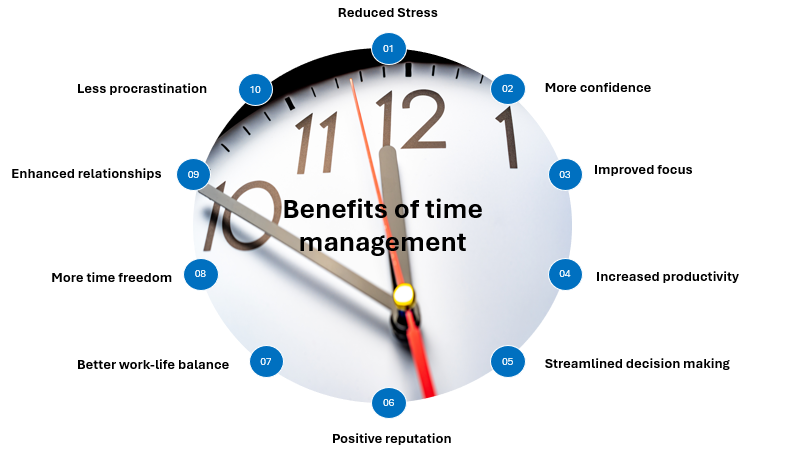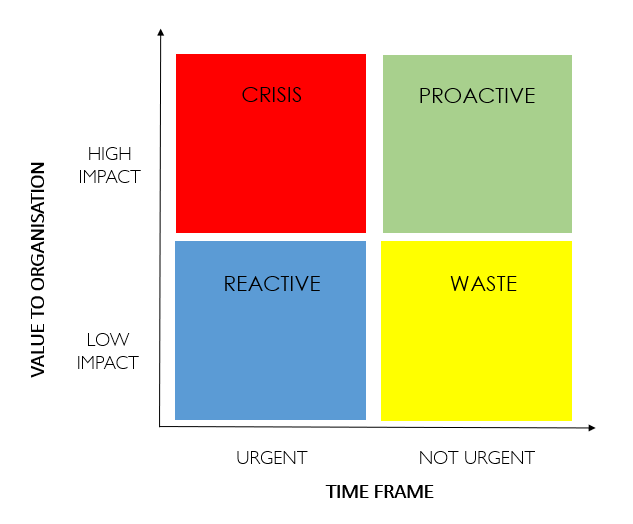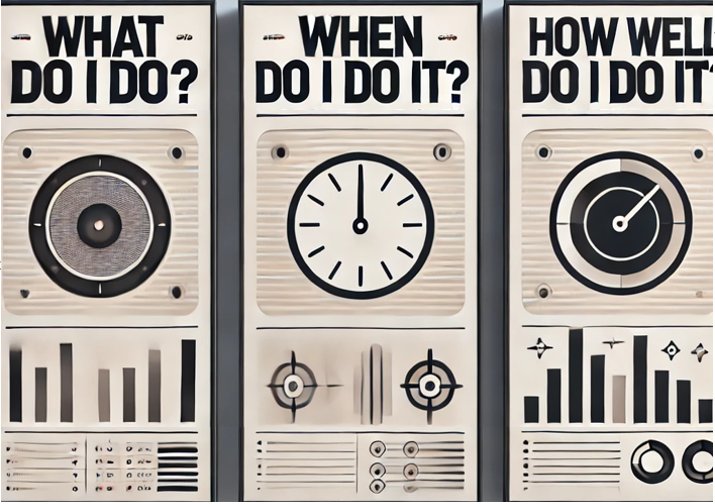- Home
- 7 Steps of Goal Setting
- Benefits of Time Management
The Top 10 Benefits of Time Management
The benefits of time management extend beyond just using "to-do lists" and having good intentions. Time management is about weaving a life that aligns with our highest priorities.
As Professor Kubler Ross points out:
"It's only when we truly know and understand that we have a limited time on earth—and that we have no way of knowing when our time is up—that we will then begin to live each day to the fullest as if it were the only one we had."
Our definition of time management focuses on prioritizing what matters most, rather than trying to control time. By mastering your time, you can enhance personal well-being, boost professional efficiency, and strengthen relationships. These interconnected benefits are unlocked through effective time management.
In this article we explore the top 10 benefits of time management in various aspects of your life, along with actionable strategies to fully harness its potential. These benefits of time management include:

Personal Well-being benefits such as:
- Reduced Stress
- More confidence, and
- Improved Focus
Professional Efficiency benefits such as:
- Increased Productivity,
- Streamlined Decision Making, and
- Positive Reputation
Balanced Lifestyle benefits such as:
- Better Work-Life Balance, and
- More Time Freedom
Relationship benefits such as:
- Better work and personal relationships, and
- Less procrastination
Personal Well-Being Benefits
Time management enhances mental clarity, reduces stress, and builds confidence by helping you stay focused and in control. Let’s look at these benefits of time management in more detail.
Benefit #1: Reduced Stress
Time management is a secret weapon against stress, particularly when juggling multiple responsibilities. Research shows it helps you take control of your day, avoid last-minute rushes, and carve out time for yourself.
Reduced stress comes with health benefits too! Managing stress improves sleep, strengthens the immune system, and fosters happier relationships. Incorporate practices like morning mindfulness meditation, 10-minute walks during breaks, or setting tech-free zones in your home to lower stress levels.
How to get started:
1. Schedule small pockets of me-time
Incorporate practices like morning mindfulness meditation, 10-minute walks during breaks, or setting tech-free zones in your home to lower stress levels. To get started
- Start small. For example, start with one practice at a time and gradually add more.
- Track progress and reward yourself for successfully integrating these into your routine
- Be specific. Set a specific time each day to establish a routine.
- Accountability. Partner up with somebody so that you can encourage each other in adopti
- Play calming music or use a timer to keep your sessions focused and stress-free.
2. Create a Master List
Many people walk around with multiple to-do lists. They have lists on paper, lists on their computer, lists on post-it notes, and lists in their head. On average, most people have about six lists.
The problem with all of these lists is that not one of them is complete. This has the consequence that we can't trust our list.
The key to time management is:
- having a system that you can trust, and
- tells you when to do it.
A system that you trust has all of your actions in it. From this perspective, putting your actions into a master list now gives you a clear idea of what is on your plate, what can be delegated, and what does not need to be done. You can now trust that these are all the actions that you currently know about.
To take this a step further and fulfill step 2 of above, is to start to consider how long each of these actions will take. Choose the most important tasks and make a commitment to start them by scheduling them into your calendar.
Read more to discover how to master stress and time management.
Benefit #2: More Confidence

Better time management enhances control and accomplishment, boosting confidence. Completing tasks and meeting deadlines reinforce belief in your capabilities, building confidence for future challenges.
Here are some strategies you can try today:
1. Break Tasks into Smaller Steps
Confronting a huge project can feel overwhelming. Conquer large tasks by dividing them into manageable bite-size segments.
For example, if you had to write a project in two weeks, break it into smaller tasks: research, outline, draft, and edit.
Set mini-deadlines for each stage, and better still, schedule time in your calendar to get it done. This prevents the sense of overwhelm and helps you budget time in advance.
Completing these builds momentum and confidence.
2. Reflect on Past Achievements
Reflecting on past achievements connects you to goal progress.
Use prompts like,
- 'What did I accomplish this week?
- What challenges did I overcome?
- What will I do differently next time?'
These questions help to guide future plans.
Remember self-compassion here and be kind to yourself if things don’t go as planned.
Benefit #3: Improved Focus
A significant issue in today’s work environment is being stretched across projects and distracted by notifications. My clients have used tools like website blockers (e.g., Freedom or StayFocusd) or set ‘Do Not Disturb’ hours on devices to minimize distractions and regain focus.
Boost your focus with these two techniques:

1. Implement the Pomodoro Technique
There are four steps to this productivity sprint;
- Choose your task
- Hustle for 25 minutes,
- Then reward yourself for 5 minutes.
- Repeat for 4 cycles and enjoy a longer break.
I find this a great technique for easily distracted clients, this increases concentration by breaking the day into manageable intervals. It’s also a burnout reducer.
2. Set Clear Priorities
Begin your day with the top three tasks.
This small step ensures prime energy and attention for significant tasks, reducing time on less important ones.
Professional Efficiency Benefits of Time Management
Mastering time management boosts productivity, sharpens decision-making, and solidifies your reputation as a reliable professional.
Benefit #4: Increased Productivity
Poor time management often leads to missed deadlines, unfinished tasks, and increased stress, leaving you feeling like you're not reaching your potential.
Mastering time management is a game-changer, turning your regular workday into a productivity powerhouse by ensuring you tackle the most important work first, reducing procrastination, and creating better focus.
| Characteristics of Poor and Good Time Management | |
|---|---|
Symptoms of Poor Time Management Often missing deadlines and feeling stressed Regularly working long hours Feeling pressured by a lack of time or too many things to do Lack of purpose or direction Jumping from crises to crises | Symptoms of Good Time Management Meet deadlines and review quality of work Achieving work life balance Lower stress and feeling more control Striving toward meaningful goals Spending quality time on important tasks |
Here’s how to supercharge your day:
1. Batch your Tasks
Group similar tasks, such as
- responding to emails,
- scheduling meetings, or
- processing invoices.
Complete them in one go to reduce the mental load of switching between different types
2. Seek Clarity with SMART Goals
Good time management focuses on what matters to you. For example, if your priority is improving team efficiency, set a SMART goal like:
'Increase team task completion rate by 15% within three months by implementing weekly progress reviews'.
This clarity keeps you focused and motivated.
Benefit #5: Streamline Decision Making

I recall working with an executive of a successful building company in Sydney who focused part of his mornings solely on thinking.
When I queried him as to why he was sitting there with his feet on his desk looking out over the Harbour Bridge, he said that "effective time management allowed him to block time for considering the long-term ramifications of decisions, which improved outcomes and reduced stress".
Kickstart your decision-making with these tips:
1. Prioritize with the Eisenhower Matrix
You can consolidate all your to-dos in tools like Trello, Asana, or Todoist and prioritize using frameworks such as the Eisenhower Matrix.
Why?
By knowing which quadrant, a task is categorized you identify the tasks that need immediate attention, those to schedule for later, those to delegate, and those to eliminate.
Tackling the most pressing tasks first by prioritizing, reduces the anxiety of looming deadlines.
2. Schedule Decision-Making Time
Identify when you’re most alert—such as early mornings or after a workout—and timebox decision-making during this peak to ensure clarity and effectiveness. By reserving prime time for prime activity, you are less distracted and make better choices.
Benefit #6: Positive Reputation
Time management can contribute to meeting deadlines with high-quality work. When you do this consistently you position yourself as reliable and competent. You become a person who can be trusted to get stuff done.
Here are two strategies to enhance your reputation through time management:
1. Communicate Proactively
There are lots of ways to do this but I find building a routine for this that is set around planning for the future week is a good start.
Once a week it is worth reviewing the following week and asking yourself what can I do next week. I call this the weekly plan.
In the weekly plan I decide
- what are the things that I need to do (and schedule them in my calendar),
- what are the things I need to defer into the future (beyond the following week), and
- what do I need to delegate or decide not to do.
- communicate changes or updates to stakeholders.
For example, send a weekly email summarizing completed tasks and upcoming priorities to keep stakeholders informed. This reduces last-minute updates and builds trust in your reliability. This proactive communication shows accountability and transparency, which helps build trust and respect within your team.
2. Set Clear Expectations
When a body of work comes across your desk, don't blindly accept it. Instead, ask yourself:
- how long will this take given your current abilities?
- when I can do this based on my current time availability?
When you are clear on this do two things, inform stakeholders with this realistic expectation, and put the actions into your calendar so that you make time for it. By doing this you set realistic expectations and ensure you can deliver on commitments, thus nurturing a reputation built on trust and transparency.
Balanced Lifestyle Benefits of Time Management
Effective scheduling creates harmony between work and personal life, granting you the freedom to pursue your passions and recharge.

Benefit #7: Better Work-Life Balance
Another major benefit of time management is that it can be the secret sauce for achieving that elusive work-life balance.
Research highlights that time management training significantly improves employees' work-life balance. Good prioritization, goal setting, and appropriate time allocation ensured that work did not spill over into personal time.
Try these strategies today:
1. Delegate More
Delegation is probably one of the most talked about yet underutilized tools.
All tasks are not created equal. When you use the Eisenhower Matrix it becomes clear which tasks to delegate, such as routine data entry, meeting scheduling, or document formatting, to capable team members or virtual assistants.
Achieving work-life balance will likely involve good delegation—delegating both what you are good at and what other people can do better than you.
2. Time Boxing
For busy people, time boxing is like creating a schedule for your brain!
Dedicate and protect specific blocks of time for various activities, allowing you to focus on deep work. In our workshops we get clients to time block their most important tasks, and also for repetitive tasks (e.g., email).
Use time blocking to work efficiently and take breaks, preventing burnout and adding rhythm to your day
Benefit #8: More Time Freedom
Good time management is like having a magic wand that grants you the gift of time freedom. This looks like greater schedule flexibility and resilience while still having time for personal pursuits. Time freedom allows you to reflect and decide what to focus on.
Start with these two actions:
1. Reflect Weekly
Each week, ask yourself specific questions such as:
- What were my biggest wins? Which tasks took longer than expected? Which activities could I improve or eliminate next week?
- Were there meetings I should not have attended? How could the meetings I host be improved?
- Are there actions I can automate with AI (e.g., drafting emails in Copilot), or
- Are there actions I could have delegated?
What could you do to free up more time for important tasks in your life?
2. Plan Weekly and Refine Daily
At the end of each week, spend 10 minutes planning for the following week's calendar. This includes:
- Outlining your top 1–3 priorities using a planner or digital calendar app like Google Calendar.
- Use color-coding to visually separate high-priority tasks from flexible slots
Remember, the calendar rarely survives contact with reality, so review and refine it daily. So, ensure you leave enough space for the unforeseeable, often more than 20% of your calendar.
Enhanced Relationships
By overcoming procrastination and improving communication, time management strengthens connections with colleagues and loved ones.

Benefit #9: Better Work Relationships
The quote by Theophrastus, “Time is the most valuable thing a man can spend,” reminds us of the key to using time wisely in relationships. Good time management enhances communication and collaboration, fostering mutual respect, trust, and a greater sense of teamwork.
Strength your relationships with these strategies:
1. Allocate Time for Communication
Schedule times to connect with colleagues. This might be regular 1:1s.
Have open consult times. This works well with managers of large teams. The way it works is that
- communicates a regular non-compulsory drop-in time (usually on Zoom or MS Teams).
- colleagues can drop in to to ask short questions. Usually manager would set rules around these questions i.e. short and no more than three.
The open consult time does two things
- it increases your availability to your team, and
- reduces incoming emails, requests for meetings, and interruptions.
Keeping communication open strengthens teamwork and relationships, and has a ripple effect on the benefits of time management.
2. Listen More, Be Less Solution-Focused
In our workshops, we often put managers in scenarios with their colleagues. What we notice is managers often jump to solutions. While useful when the answer is needed quickly, they tend to struggle to ask open questions that lead to engagement and innovation.
Focus on understanding others by asking open-ended questions like, 'What challenges are you facing?' or 'How can I support you better?' Combine these with empathetic responses to foster trust.
Benefit #10: Less Procrastination
Procrastination is more than calendars and to-lists. At it's core, procrastination an emotional regulation issue, yet time management does help to reduce it. We procrastinate on important yet non-urgent tasks, so beating procrastination can lead to a more fulfilling life with less stress.
Break free from procrastination with these approaches:
1. Watch Your Self Talk
My experience working with procrastinators is that there are about a million other things they would like to do, rather than what they should do.
The other common theme is that what precedes the decision to procrastinate are excuses!
For example, common excuses are
- "life is too short",
- "I don't have enough information to start",
- "I don't have enough energy".
The problem is not the excuses as there is an element of truth to them. The problem for the procrastinator is the conclusion to these excuses.
The conclusion leads the procrastinator to delay the task. So how do you change your conclusion to these common excuses, through intention plans and the MCII technique.
2. Adopt the Two-Minute Rule
You can overcome inertia to start with this strategy. All of us can do something for two minutes. I procrastinate reading a book, but I can read for 2 minutes. I procrastinate exercising, but I can run on the spot for 2 minutes.
So ask yourself, what can I do in 2 minutes that moves this task forward. You might surprise yourself when you keep going.
These benefits of time management help to overcome the initial barrier of starting tasks, allowing you to quickly tick off small items and build momentum for tackling larger projects.
Conclusion to the Benefits of Time Management
The benefits of time management can transform both your professional and personal life. Effective time management improves focus and decision making and helps you do what matters. You experience increased productivity and reduced stress, leading to better mental health and overall well-being. At the same time effective time management has ripple effects on your reputation opening doors to new opportunities and building better relationships. Ultimately, by taking control of your time, you create a balanced and fulfilling life that reflects your true potential.






New! Comments
Have your say about what you just read! Leave me a comment in the box below.